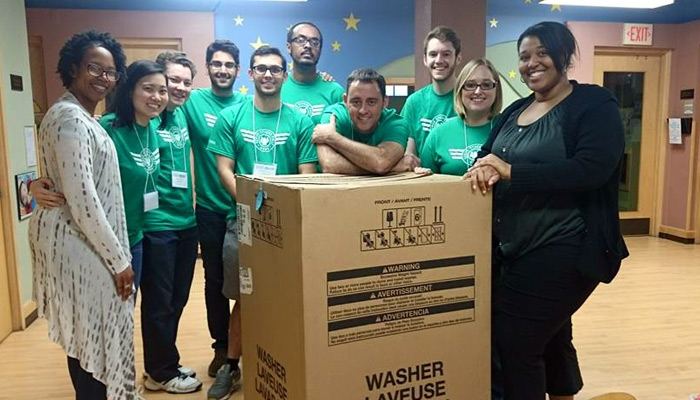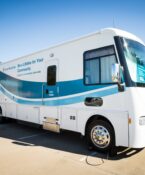Coming clean in a time of need
It was a no-brainer, they said.
Students in one of UNT Health Science Center’s most rigorous programs saw working folks struggling – and fixed their problem.
Here’s how it unfolded on a recent afternoon.
Each new crop of Medical Sciences students, part of an intense 12-month master’s degree program, does a team-building exercise, traditionally a fun contest on the campus. This year, supporting the university’s core values, they broadened their reach by taking on volunteer work in the community.
A group of eight students assigned to the Fort Worth YWCA daycare for disadvantaged children was headed up by William “Rhett” Butler, who at age 42 describes himself as a “nontraditional” student.
“We were cleaning the toys, taking down bulletin boards,” he said. “I was in the infant room, having a good time. I have a wife, a 3-year-old and a baby 7 months old, so I pretty much know this stuff.”
Caring for infants generates laundry – sheets, towels, blankets. “One of the teachers asked me to help her start the washing machine. I thought, how hard can this be? Push a button.”
But the machine’s clutch was broken. “The teacher put a screwdriver in a hole and said, ‘You reach in and turn the drum till it catches.’ I did, and it finally started.
“I saw other laundry hanging up to dry, so I knew the machine wasn’t spinning enough to wring out the water.
“I asked myself, what would my wife say if my kids were in a school without a washing machine?” Butler said. He rounded up his compatriots. They pooled their money. Butler jumped in his truck.
“I got lucky – Sears was having a 40 percent off sale. I got the washer loaded in my truck and called the others: ‘Meet me in the parking lot.’ It was not that big a deal.”
“The students told us they were going to run an errand,” said childcare Assistant Director Deidra Davis. “Next thing you know, they were carrying a brand new washing machine into the center. We’re so thankful for this thoughtful and generous gift.”
An hour or so later, the washer was humming away.
But the students weren’t done yet. Explained Butler, “We hauled the old machine off to the junkyard.” All in an afternoon.
In the photo, left to right: D’Africa Boyd, Director of the YWCA’s Rosie K. Mauk Child Development Center; and students Marie Chen, Russell Donevant, Yousuf Kidwai, Mitchell Hymowitz; Moktar Sheikh-Salah, Rhett Butler, Thomas McElwain, and Amber Beckham; and Deidra Davis, Assistant Director of the center.


![Uyen Sa Nguyen Scaled[58]](https://www.unthsc.edu/newsroom/wp-content/uploads/sites/16/Uyen-Sa-Nguyen-scaled58-145x175.jpg)



Social media